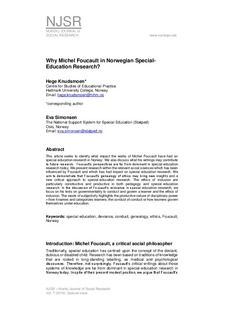Why Michel Foucault in Norwegian Special-Education Research?
Original version
Knudsmoen, H. & Simonsen, E. (2016). Why Michel Foucault in Norwegian Special-Education Research? Nordic Journal of Social Research, 7(Special issue), 36-50. doi: 10.15845/njsr.v7i0.901 10.15845/njsr.v7i0.901Abstract
This article seeks to identify what impact the works of Michel Foucault have had on special-education research in Norway. We also discuss what his writings may contribute to future research. Foucault’s perspectives are far from dominant in special-education research today. We present research within the relevant social sciences which has been influenced by Foucault and which has had impact on special-education research. We aim to demonstrate that Foucault’s genealogy of ethics may bring new insights and a new critical approach to special-education research. The ethics of inclusion are particularly constructive and productive in both pedagogy and special-education research. In the discussion of Foucault’s relevance in special-education research, we focus on his texts on governmentality to conduct and govern a learner and the ethics of inclusion. The mode of subjectivity highlights the productive nature of disciplinary power –how it names and categorizes learners, the conduct of conduct or how learners govern themselves under education.
Description
This is an Open Access article licensed under a Creative Commons Attribution 3.0 International License. The article can be found on publisher's website: https://boap.uib.no/index.php/njsr/article/view/901/882
